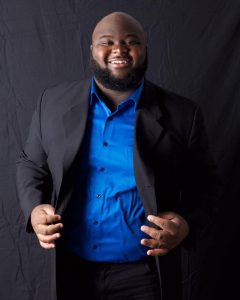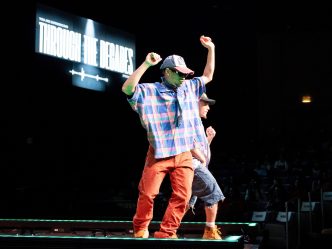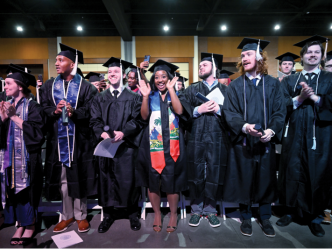When music education major and accredited vocalist Ontario Williams began rehearsing for the 2020 Southeastern Region National Association of Teachers of Singing (SERNATS) Annual Conference earlier this year, little did he know how much the coronavirus pandemic would impact his senior year at Augusta University.
While Williams is set to graduate this coming December, his final SERNATS conference and student audition in March was held virtually due to concerns about COVID-19.
Instead of traveling to Georgia Southern University for the competition, Williams submitted a video accompanied by Dr. Julie Neish, director of choral activities and assistant professor of music-voice at Augusta University.
“This was my third year competing in SERNATS and each year the conference is held in a different state or region such as Alabama, Florida, Georgia, Puerto Rico or the Virgin Islands,” Williams said. “This year, it would have been in Statesboro at Georgia Southern and, typically, we would be competing live, face to face with our judges. But not this year. With coronavirus, nothing has been typical this year.”
For Williams, not being able to perform live in front of an audience or judges was a major challenge.
“It was so different because, for me, I’m a people pleaser,” Williams said, laughing. “When I perform, I’m always asking myself, ‘What does my audience like to see? What does my audience like to hear from me?’ I’m always trying to engage with my audience and just sing to my audience. But, with having to send in the recordings, I didn’t really have an audience.”
Singing to an empty room just doesn’t come naturally, Williams said.
“I had my teacher who recorded the song on her phone and then I have our collaborative pianist accompanist, she was just at the piano,” Williams said. “I was really just singing to myself and trying to imagine this theater filled with people. It was tough because I get my energy when I sing on stage from people in the audience.”
Even during live competitions with only three or four judges, Williams said he can feed off their enthusiasm.
“With one person in the room, I can feed off their energy and I can give them what I like to do,” Williams said. “But having just a phone recording you and then a piano playing while you’re just singing to yourself is very difficult.”
Despite those challenges, Williams received first place in both music theater and the Hall Johnson spiritual category in this year’s SERNATS auditions. His performances were so outstanding that he advanced to the national semifinals that will be held online June 17-20. Finalists for the National Association of Teachers of Singing (NATS) will be announced on Sunday, June 21 in a live Facebook broadcast.
The top three singers in each category from the semifinal round of competition will advance to the final round as part of the NATS Virtual National Conference from June 24-30 and the national finals will be June 28 in a viewable format with a panel of notable judges and live streamed announcements of the winners.
Several of Williams’ fellow Augusta University students also did well in the regional SERNATS conference. Awards went to: Sawyer Branham, first place in the classical category and second place in music theater; Michenzie Reese, third place in music theater; Danny Roush, third place in the classical category; Rhett Lever, second place in the classical category and third place in music theater; and Micheala Lawlis, fourth place in the classical category.
Williams said he was thrilled to still be able to provide the judges with an outstanding performance, even if it had to be virtual.
“This is my first year doing the Hall Johnson spirituals,” Williams said. “So, to place first in both music theater and the Hall Johnson spirituals category at SERNATS, was extremely gratifying.”
Dr. Christina Amonson, an assistant professor of voice and the director of opera initiative at Augusta University, said she couldn’t be prouder of Williams and all of the students competing in this challenging year.
“I’m thrilled our students went the extra mile to do the online recording and submit their performances,” Amonson said, adding that Pamplin College of Arts, Humanities, and Social Sciences took care of the students’ fees for the competition. “And for Ontario to win first place in two categories and he’s a national semifinalist for the Hall Johnson spiritual division is fantastic.”
Even though the COVID-19 pandemic has dramatically impacted vocalists and musicians around the world, Amonson is glad to see students still being able to compete and receive the credit they deserve.
“We’ve had a lot of bad news as singers during COVID because, currently, they’re telling us in the field that it’s not going to be safe to sing in groups for a long time, possibly even two years,” Amonson said. “Choirs, operas, musical performances and even the Metropolitan Opera has canceled their entire fall season. The next thing they will do is their New Year’s Eve Gala, provided that’s even possible. On Broadway, most houses are darkened through October.”
The coronavirus having such a direct impact on an entire profession is difficult to navigate, Amonson said.
“We’re waiting for more research to happen this summer, but I think the general consensus is that, until there’s a vaccine, it won’t be safe for us to perform because they call us ‘super spreaders,’” Amonson said. “The truth is, we spit in close proximity, so it may be a little while before things return back to traditional performances. So, I’m thrilled that our students took part in the online portion of this competition and really did well.”
In fact, Amonson said it meant a great deal to her that one of the final in-person projects that her students were involved in was recording their SERNATS auditions before live classes were suspended at Augusta University.
“It was definitely a different learning experience for our students to have to perform for a camera,” she said. “They would stop and want to do another take, but I was like, ‘Nope. That’s not how this rolls. This is a competition, so you’ve got to just pull it together, take a breath and let’s do this.’”

It was a team effort to get all of the students’ videos recorded and submitted to SERNATS by the deadline, Amonson said.
“We were so lucky to have Dr. Julie Neish accompany all of our students while I videoed them, enabling us to limit possible exposure by ensuring that there were only three people in the room,” she said. “Each student sang three to four songs, depending on their category, so she played over 80 performances in two days. She’s the true hero of this story.”
As a result, the Augusta University students stepped up to the challenge and gave outstanding virtual performances, as did a lot of students across the country, Amonson said.
“I must say, the NATS organization made allowances for people who didn’t have the opportunity to work with a pianist to just use a recorded piano track. Under normal circumstances, that would never be considered OK, but I adjudicated a lot of singers performing their auditions in their bedrooms, their living rooms and dorm rooms,”Amonson said. “In fact, a lot of students went to churches because churches have a bigger space with a pianist over on the side.”
Vocalists and musicians all across the globe are trying to adapt to this new world with the COVID-19 pandemic, she said.
“I think people, deep down, just want to make music and we will figure out how to do that, despite this pandemic,” Amonson said. “Just because we can’t have live vocal performances, that doesn’t mean music is not going to happen. We’ll make it happen.”
 Augusta University
Augusta University




